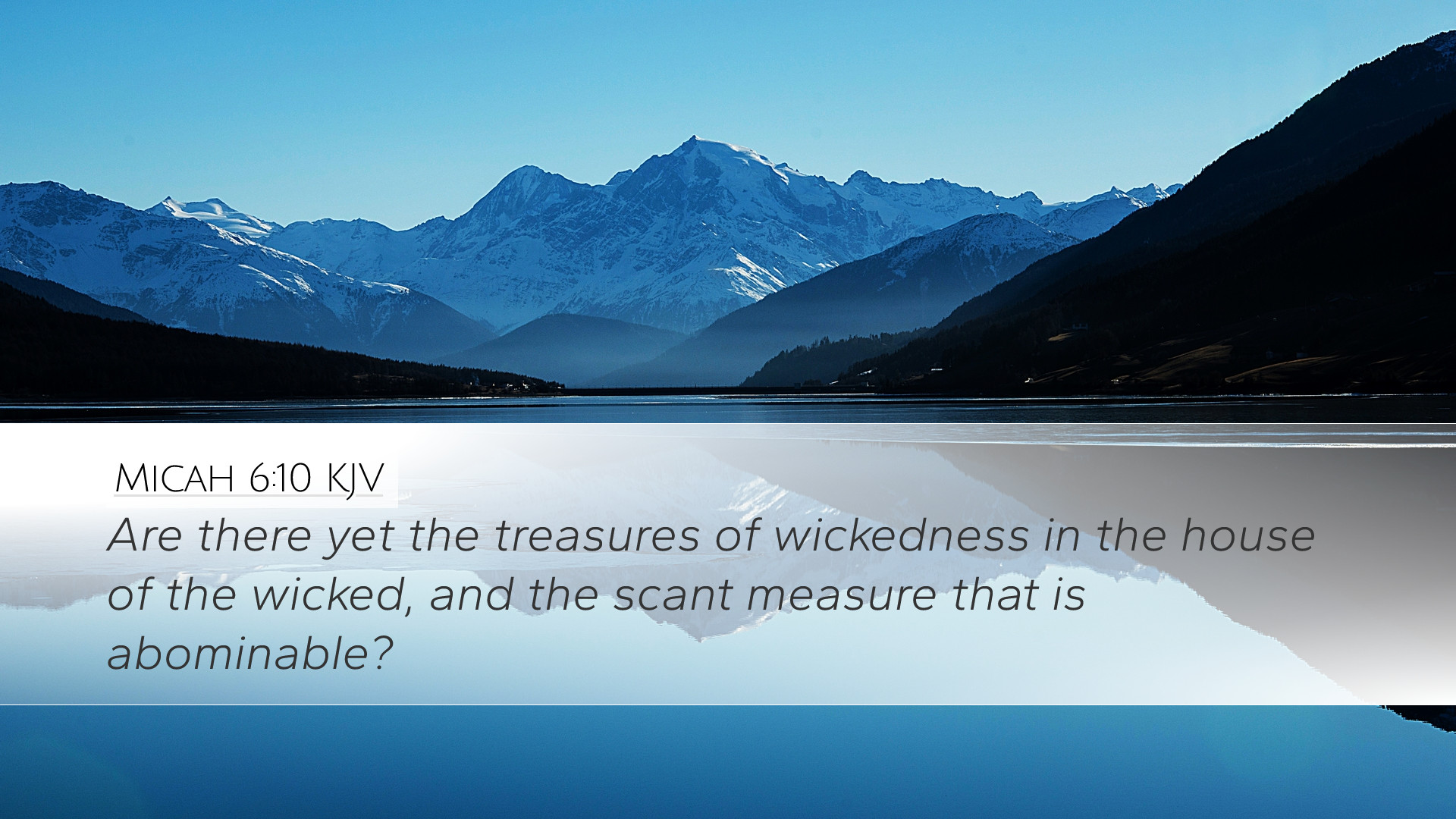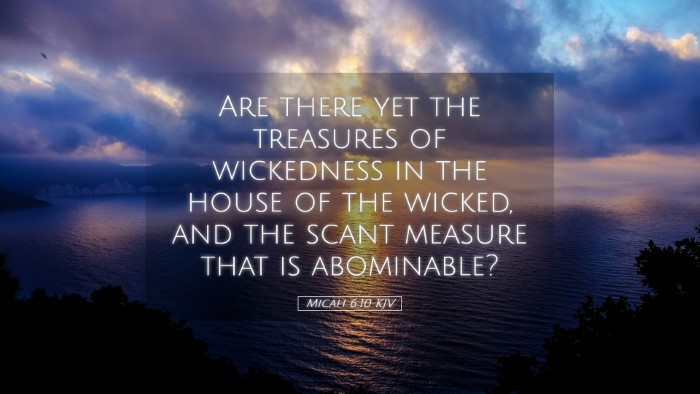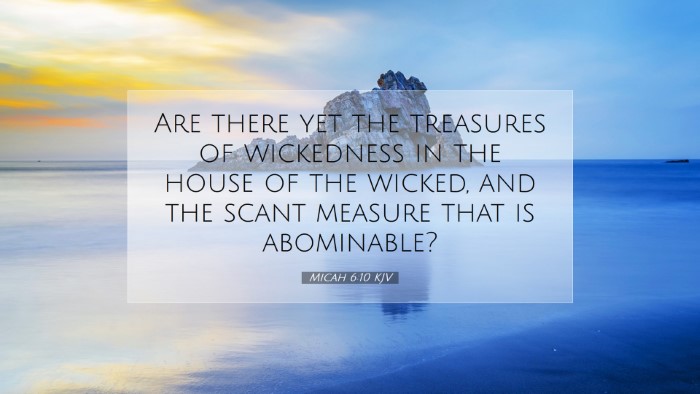Old Testament
Genesis Exodus Leviticus Numbers Deuteronomy Joshua Judges Ruth 1 Samuel 2 Samuel 1 Kings 2 Kings 1 Chronicles 2 Chronicles Ezra Nehemiah Esther Job Psalms Proverbs Ecclesiastes Song of Solomon Isaiah Jeremiah Lamentations Ezekiel Daniel Hosea Joel Amos Obadiah Jonah Micah Nahum Habakkuk Zephaniah Haggai Zechariah MalachiMicah 6:10
Micah 6:10 KJV
Are there yet the treasures of wickedness in the house of the wicked, and the scant measure that is abominable?
Micah 6:10 Bible Commentary
Commentary on Micah 6:10
Verse: Micah 6:10 - “Are there yet the treasures of wickedness in the house of the wicked, and the scant measure that is abominable?”
Introduction
This verse serves as a poignant reminder about the consequences of greed and corruption. The prophet Micah, advocating for justice and righteousness, raises a rhetorical question directed at Israel, conditioning them to reflect on their moral and ethical decay. Micah 6:10 puts a spotlight on the practices of the wicked and the spiritual malaise underlying their actions. This commentary synthesizes insights from notable public domain theological works including those of Matthew Henry, Albert Barnes, and Adam Clarke.
Contextual Background
During the time of Micah, Israel was gripped by social injustice and moral corruption. The leaders and affluent members of society were exploiting the vulnerable, manipulating standards for their gain, while the prophetic voice raised against such practices was fraught with difficult truths about God's judgment. This setting frames Micah's questions, compelling both leaders and the common populace to self-examine their practices.
Analysis of the Text
The verse delves into the metaphoric treasures of wickedness, suggesting that the wealth accumulated through unrighteous means is not truly blessed but is rather an abomination in God’s sight.
- The Treasures of Wickedness: Matthew Henry elucidates that these treasures symbolize the gains from deceitful and immoral practices. Wealth gained without integrity serves as a burden instead of a blessing.
- The Scant Measure: Barnes interprets “scant measure” as a reference to dishonest trade practices, where merchants cheat their customers with unjust weights and measures—this reflects a pervasive dishonesty that strays from God’s commandments.
- God’s Judgment: Adam Clarke emphasizes that Micah’s pointed inquiry serves as a divine challenge. God’s perspective is withering to the corrupt; their ill-gotten gains will not stand against divine scrutiny.
Theological reflections
As theologians reflect on Micah 6:10, several themes resonate:
- Integrity in Conduct: The Hebrew scriptures repeatedly stress moral integrity. Micah’s charge addresses a fundamental divine concern—righteousness in both personal and communal affairs.
- The Nature of True Wealth: The treasures accumulated through wickedness are fleeting and ultimately devoid of value. True riches are aligned with God’s righteousness and love for justice.
- Social Justice: This passage highlights the call for social justice, demanding that those in positions of power recognize their obligations to uphold ethical standards that promote the welfare of the vulnerable.
Practical Application
For pastors and church leaders, Micah 6:10 serves as a clarion call to uphold integrity in ministry. Understanding the dangers of corrupt practices can help foster environments that champion transparency and accountability.
- Preaching on Integrity: Pastors are encouraged to highlight the importance of integrity in every facet of life, be it personal, professional, or communal.
- Teaching about Righteousness: Incorporate teachings about ethical living that align with God’s commandments into church curriculum, focusing on the implications of dishonesty.
- Advocacy for Justice: Encourage congregants to engage with social justice issues, reflecting the heart of God towards the marginalized and oppressed, adhering to Micah 6:8: “to do justly, and to love mercy, and to walk humbly with thy God.”
Conclusion
Micah 6:10 starkly challenges the reader with profound questions regarding integrity, morality, and the nature of true wealth. It serves to remind believers that all actions, especially those related to the acquisition of wealth, merit divine scrutiny. The insights from Matthew Henry, Albert Barnes, and Adam Clarke collectively urge congregations to reflect upon their integrity and to strive for righteousness in all dealings. As one contemplates these profound truths, there emerges a clearer picture of the call to live a life that honors God through justice, mercy, and loving kindness.


